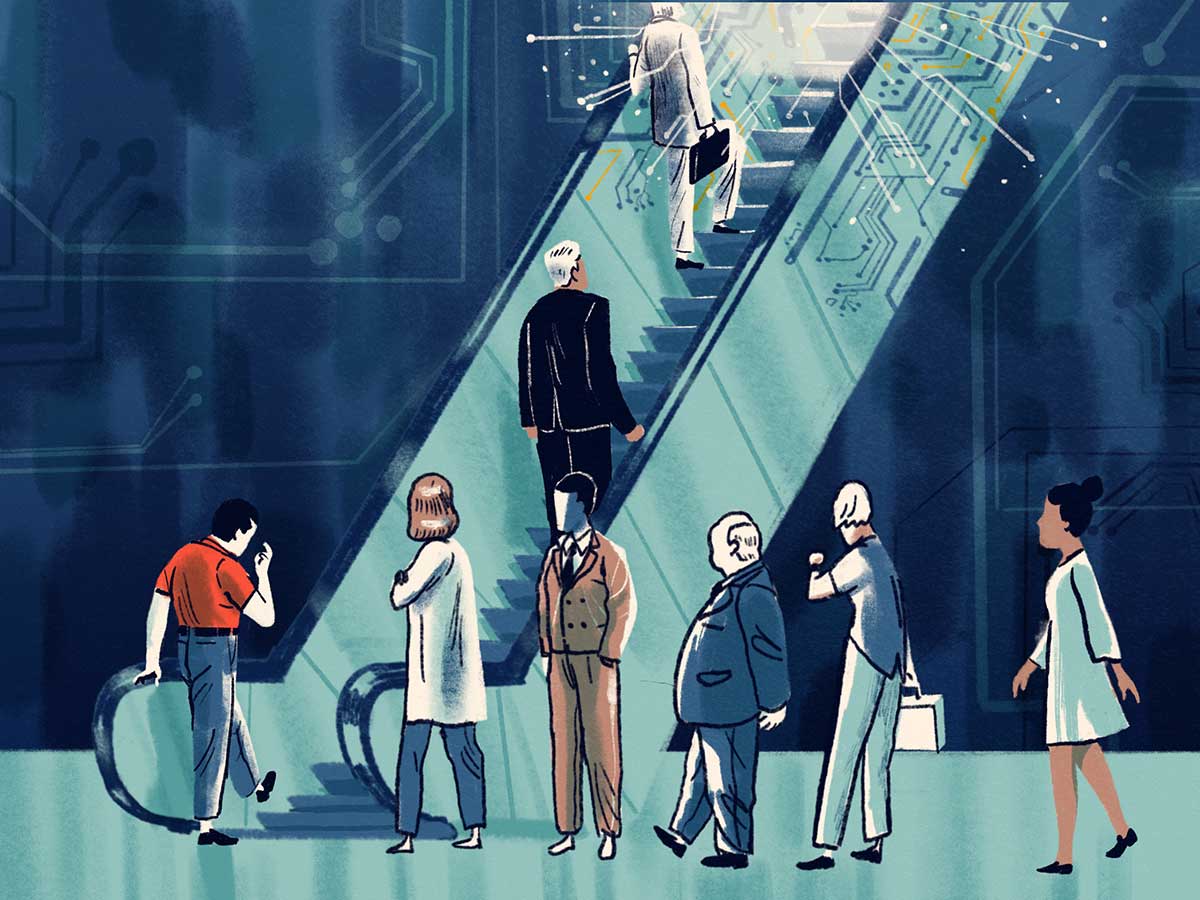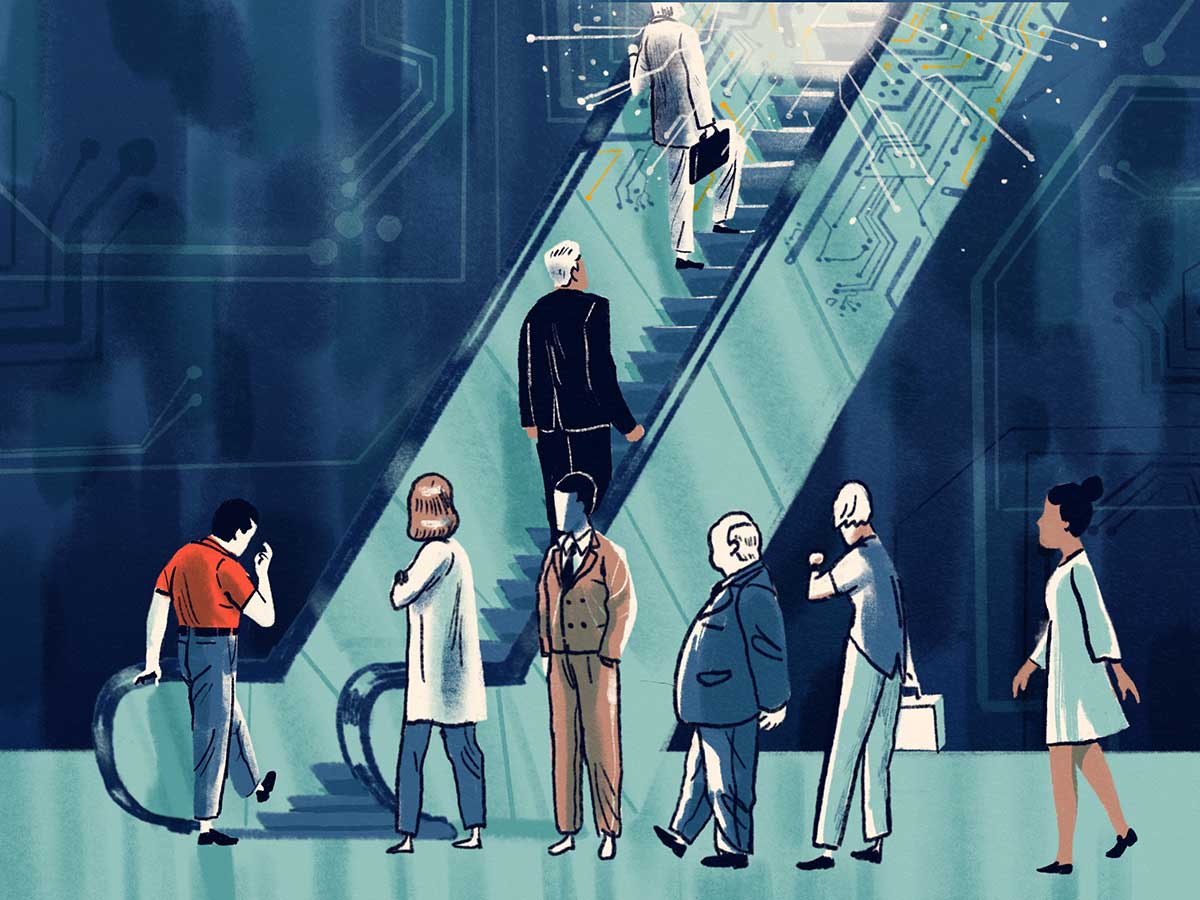
Canadian companies slow to adopt AI technologies, report says
 Canadian companies are taking cautious steps towards implementation of AI with sourcing the right talent and redesigning workflows cited as some of the practical barriers to overcome (Illustration by Drew Shannon)
Canadian companies are taking cautious steps towards implementation of AI with sourcing the right talent and redesigning workflows cited as some of the practical barriers to overcome (Illustration by Drew Shannon)
Canadian businesses are behind those of other countries when it comes to adoption of artificial intelligence technologies, according to a Forbes Insights report published late last year. But it’s not too late to catch up, say experts in the field.
According to the report, which surveyed 305 global executives in 10 countries in July 2018, Canada ranked last for successful deployment of narrow AI technologies such as deep learning and machine learning. Forty-four of the respondents were Canadian, which was the second-largest group by nation in the survey.
OBSTACLES TO OVERCOME
Canadian businesses have practical barriers to overcome, says Sarah Villeneuve, policy analyst at the Brookfield Institute for Innovation + Entrepreneurship, a think tank founded in 2015 to advance innovation in Canada.
“AI has enormous potential to transform productivity across all sectors,” she says. “But the gains will only be realized if all the necessary complements are in place in Canadian firms.”
Barriers include:
- Sourcing the right talent
- Centralizing and structuring data
- Establishing an IT infrastructure
- Achieving leadership buy-in
- Redesigning workflows
But finding talent is the most challenging obstacle, Villeneuve says.
“Large foreign businesses have come to Canada, and they’re attractive to our graduates and skilled workers,” she says. “There’s a bit of a struggle for Canadian businesses to attract that talent.”
Once companies have knowledgeable staff in place, the other factors can be resolved, Villeneuve explains.
However, there are signs Canada is doing its part to develop an AI talent pipeline.
In 2017, The Vector Institute, an independent institution associated with the University of Toronto, announced a scholarship program to fund master’s students in their AI research at one of 10 approved university programs in Ontario, with the goal of boosting the number of artificial intelligence graduates to 1,000 annually.
As well, NEXT Canada, a non-profit entrepreneurship incubator, has recently launched an education program called NextED. One stream of the program is designed to reskill managers and employees; another is designed for executives.
CANADIAN CAUTION IS APPROPRIATE
According to the report, while 68 per cent of Canadian companies have deployed AI, only 31 per cent of Canadian adopters said their implementation was a real success, compared to 59 per cent in India, 58 per cent in Germany and 55 per cent in China.
The report flies in the face of Canada’s image as a hotbed for AI research and a thriving innovation ecosystem. Despite Canada’s conservative approach to adoption, Michael Dingle, partner, technology sector, at PwC, is not overly concerned.
“This is the first inning,” says Dingle. “I would be concerned if we had this discussion in three to five years and we were still in this position. But it’s typically Canadian to be cautious, measured, pragmatic. All of those things are appropriate.”
Business leaders are understandably concerned about the security of the data they must collect and store to deploy machine learning applications, he notes. They’re also approaching the ethical questions of AI with caution.
As well, businesses must first realize that data has value, and align their business models around secure, private data collection and aggregation. Some Canadian organizations are further along than others in realizing and implementing that 21st century reality, Dingle says.
TECHNOLOGY AND CPAS
Listen to CPA Canada’s podcast series about technology and leadership, which explores the role accountants can play in the world of AI and privacy legislation. And if you’re looking for a foundational resource on this topic, CPA Canada, in collaboration with AICPA, will be releasing “A CPA’s Introduction to AI: From algorithms to deep learning, what you need to know” later this month. We will also be publishing a paper on big data and artificial intelligence, with a focus on the future of accounting and finance, next month.